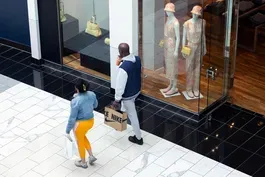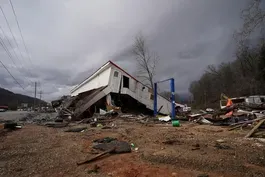
What to know about the new federal law against revenge porn
Clip: 5/18/2025 | 4m 43sVideo has Closed Captions
What to know about the new federal law against revenge porn and explicit deepfakes
On Monday, President Trump is expected to sign the bipartisan Take It Down Act, which calls for stricter penalties for posting sexually explicit images online without the subject’s consent or with harmful intent — what’s called “revenge porn.” Ali Rogin speaks with tech journalist Laurie Segall, CEO of Mostly Human Media, to learn more.
Problems with Closed Captions? Closed Captioning Feedback
Problems with Closed Captions? Closed Captioning Feedback
Major corporate funding for the PBS News Hour is provided by BDO, BNSF, Consumer Cellular, American Cruise Lines, and Raymond James. Funding for the PBS NewsHour Weekend is provided by...

What to know about the new federal law against revenge porn
Clip: 5/18/2025 | 4m 43sVideo has Closed Captions
On Monday, President Trump is expected to sign the bipartisan Take It Down Act, which calls for stricter penalties for posting sexually explicit images online without the subject’s consent or with harmful intent — what’s called “revenge porn.” Ali Rogin speaks with tech journalist Laurie Segall, CEO of Mostly Human Media, to learn more.
Problems with Closed Captions? Closed Captioning Feedback
How to Watch PBS News Hour
PBS News Hour is available to stream on pbs.org and the free PBS App, available on iPhone, Apple TV, Android TV, Android smartphones, Amazon Fire TV, Amazon Fire Tablet, Roku, Samsung Smart TV, and Vizio.
Providing Support for PBS.org
Learn Moreabout PBS online sponsorshipJOHN YANG: Tomorrow, President Trump is to sign the bipartisan Take It Down Act.
It calls for stricter penalties for posting sexually explicit images online without the subject's consent or with harmful intent.
That's sometimes called revenge porn.
Ali Rogan is back with a conversation with Laurie Segall, a tech journalist and CEO of Mostly Human Media.
ALI ROGIN: Laurie, thank you so much for joining us.
First, let's talk about some of the terms that this law deals with.
There's deepfake pornography and there's revenge porn.
Let's talk first about what those mean.
LAURIE SEGALL, CEO, Mostly Human Media: Sure.
It's interesting.
First of all, a sexually explicit deep fake is essentially as if you're looking at a photo of yourself nude.
It is not you that was used with artificial intelligence.
So now you see the rise of apps and the rise of technology that enables people to digitally undress someone in a couple clips.
And then revenge porn and nonconsensual imagery is essentially if someone has a nude image of you and puts it out there without your consent.
I think consent is the biggest word on all of these.
ALI ROGIN: And so what does this law do?
How does it work?
LAURIE SEGALL: This is the first federal legislation that actually addresses both of these issues, nonconsensual imagery and sexually explicit deepfakes.
And what it does is it criminalizes the publication of these types of this nonconsensual imagery.
And it also requires tech platforms, once a victim has reported this, to remove that imagery within 48 hours.
So over the last couple of years, we've seen a lot of state laws that are popping up that vary in scopes.
Some are civil, some are criminal that try to address this type of thing.
Same with nonconsensual imagery and these revenge porn laws.
But we haven't had a federal law.
And so, you know, a federal law that actually addresses this and criminalizes the publication of this makes the stakes a lot higher.
ALI ROGIN: And what have those tech companies been saying, the ones that are going to be in charge of compliance?
LAURIE SEGALL: A lot of tech companies are behind this.
Right.
You have Snap, Meta has come out and supported this.
There are some issues that people are saying, well, could this become a free speech issue?
Could people report content that they just don't like and try to turn this into something for their own benefit?
And so there are folks in the free speech space and area that are a little bit concerned about this.
But largely, I would say this is a bipartisan effort that folks have come forward and a lot of folks are behind this.
ALI ROGIN: I know another piece of criticism that some of those groups have leveled is the idea that tech companies might just paint too broad a brush and censor everything just because they don't want to have to deal with individual cases of determining whether something needs to be taken down.
What's the risk of that sort of thing happening?
LAURIE SEGALL: Yeah, I think critics have talked about this as like one of the main unintended consequences.
And I think President Trump made a comment, he said something along the lines of, oh, maybe he'll use this because people say bad things about him online.
I'm not quoting it word for word.
And so there is that fear that this could overreach.
But I would say as someone who's been covering this, one of the biggest problems that victims face when this happens, it's as if their nude images are everywhere and there is nothing they can do.
And they are knocking on the doors of tech companies, they are not getting any responses.
Many, many times they feel hopeless.
And it is a new type of trauma.
And so I think this idea that within 48 hours action has to be taken, you know, under the right circumstances, I think it'll be a big game changer to a lot of the folks who have dealt with this type of digital abuse.
ALI ROGIN: And around the same time that this bill is becoming law, in the last few days, the person who was behind one of the biggest deepfake nonconsensual imagery websites was taken down and also unveiled.
Is that a coincidence?
LAURIE SEGALL: Look, this is a game of whack-a-mole.
You take one thing down, there's all these other things.
And this site was called Mr. Deepfakes.
It's no longer, you know, it's no longer in service.
At its peak, 18 million people were actually going to this website that literally took the faces, the images and created hyper realistic deep fake pornography.
It was a nightmare for so many women.
It took so many things.
It took lead laws changing in the U.K. and also I would say investigative journalism and people shouting out loud that this isn't okay.
I mean went out to Canada and we confronted the man we believe to behind this with a tremendous amount of evidence and asked for comment.
He was living a double life.
He created an army of Mr. Deepfakes.
And so I think like we almost have to create our own army.
And that army includes legislation and laws and accountability at tech companies and unfortunately victims speaking up and many of who had about how this is real abuse.
It's not just something that happens online.
There's a real impact offline.
ALI ROGIN: Laurie Segall, CEO of Mostly Human Media, thank you so much.
LAURIE SEGALL: Thanks.
Consumer confidence hits near-record low amid trade worries
Video has Closed Captions
Clip: 5/18/2025 | 5m 54s | Consumer confidence hits near-record low amid worries over Trump trade policy (5m 54s)
Looking back at Mount St. Helens’ eruption 45 years later
Video has Closed Captions
Clip: 5/18/2025 | 4m 33s | What scientists have learned from Mount St. Helens’ devastating eruption, 45 years later (4m 33s)
News Wrap: Biden diagnosed with prostate cancer
Video has Closed Captions
Clip: 5/18/2025 | 3m 11s | News Wrap: Biden diagnosed with prostate cancer, reviewing treatment options (3m 11s)
Scientists working on flagship climate report dismissed
Video has Closed Captions
Clip: 5/18/2025 | 5m 31s | What the dismissal of hundreds of scientists means for a flagship climate report (5m 31s)
Providing Support for PBS.org
Learn Moreabout PBS online sponsorshipSupport for PBS provided by:
Major corporate funding for the PBS News Hour is provided by BDO, BNSF, Consumer Cellular, American Cruise Lines, and Raymond James. Funding for the PBS NewsHour Weekend is provided by...















